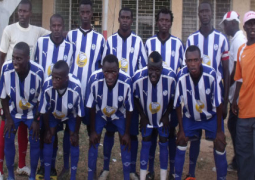The minister of Finance and Economic Affairs, Hon. Abdou Kolley, on Tuesday presided over the official launching of a 7.6-million Euro EU-MDG-1C project in Pakaliba village in Jarra East, Lower River region.
The initiative seeks to improve food security through crop production intensification and school-feeding programmes in the country.
The EU-funded initiative seeks to accelerate progress towards achieving MDG 1C, which is to reduce by half, between 1990 and 2015, the proportion of people suffering from hunger.
The MDG1C initiative is part of the overall development project which seeks to establish sustainable commercialised agriculture that will facilitate the foundation of a nationally owned homegrown school-feeding programme.
The project is meant to be piloted in Upper River Region, North Bank Region, Central River Region south and north, and Jarra East in Lower River Region.
The project is being implemented for three years by the Food and Agriculture Organization (FAO) in partnership with the World Food Programme (WFP).
In his official launching statement, the finance minister said that following the submission of a proposal by the Gambia government in partnership with FAO and WFP - the two UN agencies identified to implement the project, the EU approved 7.6 million euros for the MDG initiative for improving food security, crop production and school-feeding programmes.
He went on to register his appreciation on behalf of the Government of The Gambia for the interventions of the country’s development partners in helping the nation in the implementation of all the agricultural projects in various sectors in the country.
Minister Kolley said the principal goal of the project is to improve food security and reduce hunger.
The project is geared towards improving household food security in the country, he said.
For his part, Dr Babagana Ahmadu, FAO country representative in The Gambia, said the main objective of the initiative is to provide funding to ACP countries which are off track in the attainment of the Millennium Development Goals.
He also stated that the overall objective of the EU support is to accelerate progress towards achieving MDG-1C in The Gambia, especially to increase household food security and incomes of participating farmers.
The project, he said, would also contribute to breaking the intergenerational cycle of malnutrition and hunger by improving nutrition in school-aged children and increasing community awareness of appropriate nutrition and dietary practices during the critical window of opportunity.
He used the occasion to express his satisfaction to the Government of The Gambia for its firm commitment to and the priority it gives to matters regarding agriculture and food security in the country.
He also thanked the EU for providing funding for the project and the Government of The Gambia for the excellent relationship with FAO and other development partners.
Madam Agnes Guillaud, EU Charges d’Affairs, said the goal of the 7.6-million euro project is to improve food security and reduce hunger in the intervention areas thereby contributing to The Gambia’s achievement of MDG 1C through support to these crucial elements needed to boost The Gambia’s agricultural sector as well as to provide a safety net in cases of food shortage.
“This project, with its two components, will firstly enhance the production of rice and eight major horticultural crops and in the targeted areas, and secondly, will supply nutrition food to schoolchildren, thereby serving as a catalyst and an incentive to farmers, targeted by the first component, to produce large quantities to be sold directly to the school-feeding programme,” she said.
Victoria Ginja, World Food Programme Country director, said with this partnership they are together laying the foundation for a homegrown school-feeding programme.
She said the aim of which is to improve food security and reduce by half the proposition of people who suffer from hunger in The Gambia.
The WFP national boss said the initiative will strengthen existing social and productive safety nets as the principal long-term commitment to combating hunger and ensuring that Gambian communities are food secure.




